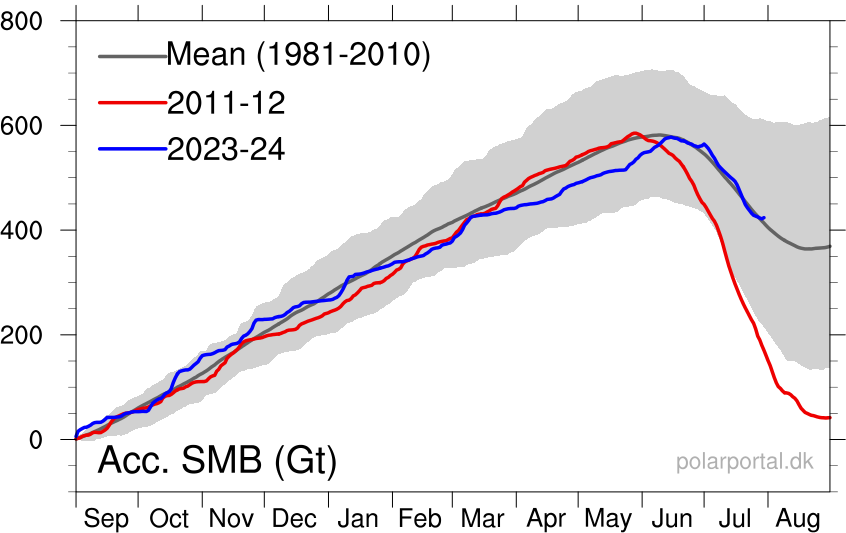Remarkable Summer Gains On The Greenland Ice Sheet; Solar Influence on Tropical Cyclones; + IPCC Misrepresents Satellite Data, Scientists Say
"This discovery may be more powerful than ClimateGate in its potential to collapse the entire anthropogenic climate-change narrative."
Remarkable Summer Gains On The Greenland Ice Sheet
On Tuesday, July 30, 2024, the Greenland ice sheet posted a remarkable ≈3 Gigaton July gain. Data from the Danish Meteorological Institute (DMI) show this to be one of the highest daily summer additions since records began in 1981.
This figure is only bested by the ≈4 Gigaton set at the beginning of the month on July 1, 2024.
The deep blue areas on the map below visualize the significant mass gains, occurring predominantly in the south:
The 1981-2010 averages call for significant summer melt at this time of year, what we saw yesterday was a 3 Gigaton gain.
Though not all plain sailing --note the two-day plunge in mid-July-- this season, overall, is proving another frustration for the alarmists; it looks set to be another year of above-average SMB for the Greenland Ice Sheet:
Despite mainstream obfuscations and outright fabrications, the tides have clearly turned for the Greenland ice sheet, since 2012:
Greenland's Petermann Glacier, for example, has grown almost ten miles since 2012, when the press hysterically announced the glacier's imminent demise:


Solar Influence on Tropical Cyclones
A new paper paper "Effects of Solar Variability on Tropical Cyclone Activity" explores the relationship between solar variability, measured by sunspot numbers (SSN), and tropical cyclone (TC) activity across six global regions: Eastern Pacific (EP), North Atlantic (NA), North Indian (NI), South Indian (SI), South Pacific (SP), and Western Pacific (WP).
Using TC best-track data and SSN, the study reveals a significant anti-correlation between yearly TC activity and yearly SSN in the North Atlantic region, evident when considering their 11-year moving averages.
Keep reading with a 7-day free trial
Subscribe to Electroverse Substack to keep reading this post and get 7 days of free access to the full post archives.







